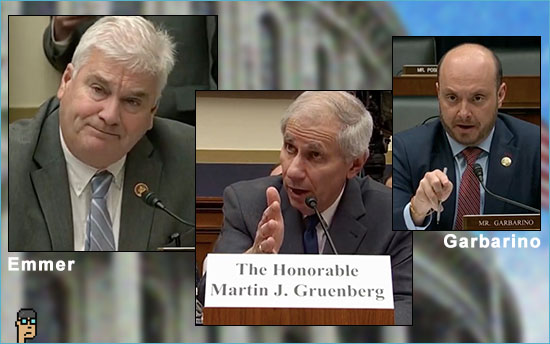Here’s today’s blockchain tipsheet… prefer it by email? Sign up here.
FDIC and the digital economy
Wednesday’s House Financial Services hearing on the recent banking failures has apparently revealed some question as to whether FDIC Chair Martin Gruenberg is willing to allow the purchase of the Signature Bank’s Signet platform which has provided an important on-ramp for fiat currency into cryptocurrency . The Wall Street Journal reported, “During the hearing, Majority Whip Rep. Tom Emmer (R, MN) asked Mr. Gruenberg whether he’d commit to allowing any buyer of Signet to continue serving digital-asset customers. ‘If that’s the nature of the acquisition, yes,’ Mr. Gruenberg said.” Read more.
But, in an edited video which includes Gruenberg’s response to a question from Rep. Andrew Garbarino (R, NY) who asks a similar question to Emmer’s, Gruenberg appears to contradict himself. Emmer said later in a Twitter thread, “Get your story straight, Chairman Gruenberg… You’re on the Congressional Record. Did the FDIC sell Signet or not? And if not, why is our government controlling one of the few private sector 24/7 money rails that supported the digital economy?” See the video.
Senator Marshall
Senator Roger Marshall (R, KS) is taking it on the chin from conservatives – namely, Club for Growth, FreedomWorks and Americans for Tax Reform – due to his partnership with Senator Elizabeth Warren (D, MA) over crypto assets and the “Digital Asset Anti-Money Laundering Act of 2022.” (Warren has said this bill will be re-introduced shortly in the 118th Congress.)
The Block’s Stephanie Murray reports on their recent letter to Marshall, “The conservative groups claim Marshall’s efforts ‘are likely to encourage digital asset companies to move outside of the U.S.’s jurisdiction.’ The letter also pointed to the recent collapses of Silicon Valley Bank and Signature Bank, saying that Marshall, Warren and [Senator Chris Van Hollen (D, MD)] are trying to ‘prevent and slow alternative vehicles for investment’ with their crypto policy moves.” Read it. And, see the letter.
notice to elected officials
Wednesday’s testimony in front of a House Appropriations Subcommittee by SEC Chair Gary Gensler continued to reverberate yesterday. Ripple CEO Brad Garlinghouse tweeted, “For the Chair of the SEC to assert that he dictates what is a security – and not the legislation from which his agency derives its power – is beyond comprehension. It’s time for elected officials in the US to take notice.” Meanwhile, Garlinghouse’s company awaits a court decision on its fight with the SEC over Ripple’s XRP token. Read more from Blockworks.
tokenization – bonds
Distributed ledger technology (blockchain) is alive and well is some parts of traditional finance including bond issuance, but there are still hills to be climbed in the United States, in particular.
Mathew McDermott, head of Digital Assets at Goldman Sachs said at a crypto conference in Hamburg, Germany this week: “I’ll speak from a highly regulated U.S. bank. We are actually not allowed to do anything on a public blockchain, be it permissionless or otherwise. The rationale being safety and soundness. Most of the development you will see certainly from the U.S. banks, JP (Morgan), ourselves and many of the others, will be on a private blockchain.” Non-US bank issuance on a public blockchain is a different story. Read more.
tokenization – analysts
TradFi analysts at Citi are saying in a new report titled, “Money, Tokens, and Games: Blockchain’s Next Billion Users and Trillions in Value,” that tokenization of traditional financial assets onto the blockchain is the next big thing for digital assets. According to Decrypt, the analysts state, tokenization “‘could be the killer use case’ for blockchain technologies, estimating that tokenization could ‘grow by a factor of 80x in private markets and reach up to almost $4 trillion in value by 2030.'” Read more.
Also read:
The Regulated Internet of Value (PDF) on the tokenization thesis by Citi
At the Turning Point — How Crypto Interacts with Real World Assets – Vinay Gupta
tokenization – artwork
Freeport, founded just last year, announced this week successful completion of its Regulation A review by the Securities and Exchange Commission (SEC) and that means “its ready to launch its anticipated platform built to support the sales of digital securities in the form of tokenized fine art,” says Securities.io.
The overarching idea here is that real world assets which are normally illiquid (hard to buy and sell) gain new opportunity for liquidity – anything from collectibles to cars to real estate – through the use of blockchain.
See the 4 Andy Warhol prints that are among the first works of real world art to launch on the Freeport platform.
great white north mining
In Canada’s British Columbia, interest in crypto mining has skyrocketed as cheap energy attracts companies from around the world. But, in a narrative familiar in the United States, not everyone in the province is convinced mining is good for their collective backyard in spite of the jobs and revenue it could produce. OilPrice.com reports the province “just introduced an 18-month moratorium on connecting new crypto-mining sites to the electric grid, causing 21 new projects to grind to a halt.” Josie Osborne, the British Colombia Energy Minister, “believes the moratorium will give the province the time needed to consult with the industry and ensure the region’s energy is being used effectively.” More here.
more tips
Space Force major to Pentagon: Mine Bitcoin! – Politico
The Next Phase of Real-Time Payments Growth Is Here (PDF) – ACI Worldwide and GlobalData
SEC Obtains Judgment Against Siblings Who Orchestrated Massive Crypto Asset Fraud – SEC.gov
Asia is ‘very likely’ to become the center of gravity for digital assets, tech company says (video) – CNBC
Why Crypto Businesses Are Flocking to the United Arab Emirates (UAE) – Solidus blog
Exclusive-Ex-CEO of Binance’s US firm has enlisted lawyer for US investigations – Reuters
If you would like this delivered as a newsletter, please sign up here.

